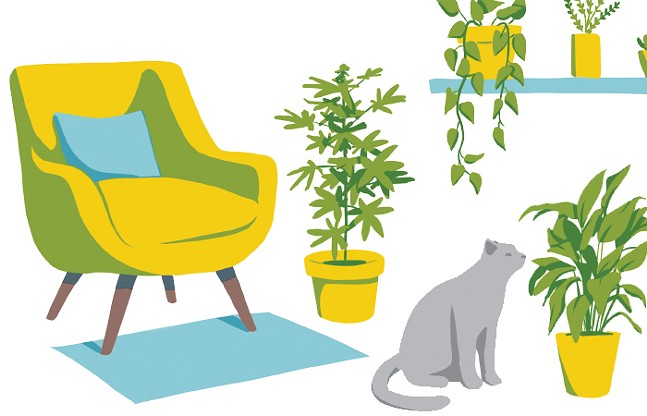Medical marijuana patients want to grow their own weed. Will the state let them?
According to patients, caregivers, and their advocates, Pennsylvania’s Medical Marijuana Program leaves a lot to be desired. The program got a C+ in a recent report by California-based advocacy group Americans for Safe Access, which examined nationwide access to medical weed. Pennsylvania’s score is a full letter grade lower than the national average, and the state scored particularly low in categories such as affordability, access to medicine, and health and social equity. One of the report’s main recommendations? Allow patients to grow weed at home.
In November 2021, Sens. Sharif Street (D-Philadelphia) and Dan Laughlin (R-Erie) introduced a bill that would permit patients in the state’s medical weed program to grow their own medicine for personal use. Citing a Department of Health report that found that some patients must drive over two hours to reach the nearest dispensary, the lawmakers argue that patients should be permitted to grow up to five adult marijuana plants, measuring more than five inches high, and possess up to 30 grams of the cannabis they grow for personal use, without a cultivation center license.
“For folks that have to get in a car and drive an hour or so away to get what they need to make themselves feel better, when they could have a couple of plants right in their house, it does seem a little bit cruel to not allow them to do that,” Laughlin says.
The bill, SB 1024, states the cultivation must occur in an “enclosed, locked-out” space that’s inaccessible to unauthorized people, including people under 21. Dispensaries would sell seeds to patients for home cultivation.
SB 1024 has been referred to the Senate Law & Justice Committee, which is chaired by Rep. Mike Regan (R-York), a leading Republican advocate for legalization. State Sen. Jay Costa (D-Forest Hills) is among the bill’s co-sponsors, and Allegheny County state representatives on the Law & Justice Committee include South Hills Democrat Wayne Fontana and McKeesport Democrat Jim Brewster, who is the committee’s Minority Chair. The committee does not currently have any meetings scheduled.
Prior to SB 1024’s introduction, Pa. legislators most recently considered allowing medical home-grow last summer, but the amendment was tabled in committee and didn’t make it into the legislation that it was intended to amend.
Pennsylvania’s medical weed program is among the five largest in the country by patient numbers and was signed into law in 2016. Local defense attorney Patrick Nightingale, who serves as the executive director of Pittsburgh NORM (the National Organization for the Reform of Marijuana Laws), says that home cultivation was included in the original bill creating the medical program, but that it “was removed once bipartisan negotiations began in earnest. There were concerns about illegal diversion and compliance with testing requirements.”
According to Cannabiz Media, 18 states plus Washington, D.C. allow some degree of home cultivation of weed.
Citing a frustration with accessibility, such as a lack of transparency about the availability of different strains and notably high prices, many of Pennsylvania’s medical marijuana patients are robustly in favor of home-grow.
“Patients are at the mercy of what the growers are producing and what their local dispensaries are stocking,” says Nightingale. “A patient may find a particular strain that works best for their condition, but that strain may not be available. Perhaps the grower has discontinued the strain because it was not producing well or perhaps the dispensary stopped stocking the strain because it wasn't selling well.”
Medical marijuana patients hope that home-grow will allow them more control over their medication supply.
“Pa. needs home-grow,” patient John Brooks writes to Pittsburgh City Paper, adding that there’s often no communication from dispensaries on which strains will be removed from their rotations.
“It can get expensive and frustrating loading up on one strain to last long enough to see your dispensary bring it back, if they ever do,” Brooks says. “[A]nd it can be frustrating talking to budtenders, where you're constantly having to ask, 'Do you have anything similar to X strain?,' just to get a very poor rec and have next to no medical relief with your purchase.”
Although wholesale prices have gone down substantially, retail prices have not seen a similar reduction. Home-grow advocates are hopeful that home cultivation will allow patients to procure their medicine at a fraction of the cost of a dispensary product.
“Our medical cannabis products are some of the most expensive products in the United States,” says Nightingale, in part, he says, because of the Pa. program’s “highly regulated” nature. “Our medical cannabis act specifically prohibits insurance coverage of medical cannabis products. Unfortunately, many patients of limited means simply cannot afford medical cannabis. I've heard heartbreaking stories of patients returning to prescription opiates ‘because at least they're covered by insurance.’”
As for why home-grow remains illegal in Pennsylvania, Nightingale believes it’s “because the majority party doesn't want to legalize home cultivation. Republicans stripped it from the bill and that's that. We have not been able to move any patient-friendly legislation for the past four years because the Republican majorities in the House and Senate simply refuse to bring bills up for consideration and votes in Committee.”
Some people blame this deadlock on lobbying by multi-state operators. Patient-run website PA Menus notes that some of the MSOs (multi-state operators) affiliated with an infamous 2019 anti-home-grow memo to New York’s then-Governor Andrew Cuomo have brands and dispensaries in Pennsylvania.
“Home growers are defending against MSOs. … Big Cannabis, if you will,” Mike Munz of the Cranberry Township indoor garden company HTG Supply tells Pittsburgh City Paper. Munz says he’s an expert, “to say the least,” in growing plants, in general, and weed, in particular, and he strongly supports home-grow. “People definitely need to be able to provide for themselves just as they do in many other circumstances,” he says.
“Patients are very suspicious of industry and for good reason,” says Nightingale. “We have an oligopoly that allows the license holders to set wholesale prices and maximize profits.”
Nightingale compares home cultivation to home brewing or gardening. Although he could make his own beer or grow his own tomatoes, “it's a lot easier going to the grocery store and distributor,” he says. “That people are free to grow their own crops, raise their own livestock and make their own beer and wine doesn't seem to have cut into the profits of retail sellers of food and beverages.”
“I do not believe the MSOs oppose home cultivation, though some have joined lobbying groups in other states that have opposed home cultivation,” Nightingale says. “I believe the market is large enough for the MSOs to thrive while also providing lower-cost alternatives.”



